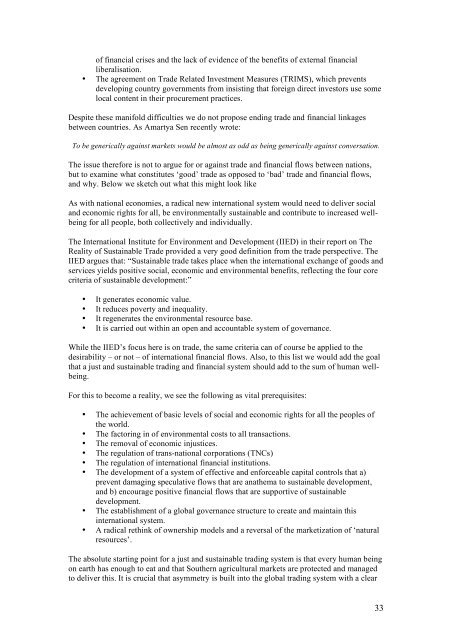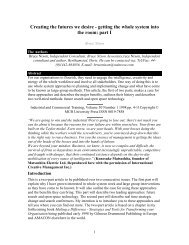From Old Economics to New Economics- Radical ... - Bruce Nixon
From Old Economics to New Economics- Radical ... - Bruce Nixon
From Old Economics to New Economics- Radical ... - Bruce Nixon
You also want an ePaper? Increase the reach of your titles
YUMPU automatically turns print PDFs into web optimized ePapers that Google loves.
of financial crises and the lack of evidence of the benefits of external financial<br />
liberalisation.<br />
• The agreement on Trade Related Investment Measures (TRIMS), which prevents<br />
developing country governments from insisting that foreign direct inves<strong>to</strong>rs use some<br />
local content in their procurement practices.<br />
Despite these manifold difficulties we do not propose ending trade and financial linkages<br />
between countries. As Amartya Sen recently wrote:<br />
To be generically against markets would be almost as odd as being generically against conversation.<br />
The issue therefore is not <strong>to</strong> argue for or against trade and financial flows between nations,<br />
but <strong>to</strong> examine what constitutes ‘good’ trade as opposed <strong>to</strong> ‘bad’ trade and financial flows,<br />
and why. Below we sketch out what this might look like<br />
As with national economies, a radical new international system would need <strong>to</strong> deliver social<br />
and economic rights for all, be environmentally sustainable and contribute <strong>to</strong> increased wellbeing<br />
for all people, both collectively and individually.<br />
The International Institute for Environment and Development (IIED) in their report on The<br />
Reality of Sustainable Trade provided a very good definition from the trade perspective. The<br />
IIED argues that: “Sustainable trade takes place when the international exchange of goods and<br />
services yields positive social, economic and environmental benefits, reflecting the four core<br />
criteria of sustainable development:”<br />
• It generates economic value.<br />
• It reduces poverty and inequality.<br />
• It regenerates the environmental resource base.<br />
• It is carried out within an open and accountable system of governance.<br />
While the IIED’s focus here is on trade, the same criteria can of course be applied <strong>to</strong> the<br />
desirability – or not – of international financial flows. Also, <strong>to</strong> this list we would add the goal<br />
that a just and sustainable trading and financial system should add <strong>to</strong> the sum of human wellbeing.<br />
For this <strong>to</strong> become a reality, we see the following as vital prerequisites:<br />
• The achievement of basic levels of social and economic rights for all the peoples of<br />
the world.<br />
• The fac<strong>to</strong>ring in of environmental costs <strong>to</strong> all transactions.<br />
• The removal of economic injustices.<br />
• The regulation of trans-national corporations (TNCs)<br />
• The regulation of international financial institutions.<br />
• The development of a system of effective and enforceable capital controls that a)<br />
prevent damaging speculative flows that are anathema <strong>to</strong> sustainable development,<br />
and b) encourage positive financial flows that are supportive of sustainable<br />
development.<br />
• The establishment of a global governance structure <strong>to</strong> create and maintain this<br />
international system.<br />
• A radical rethink of ownership models and a reversal of the marketization of ‘natural<br />
resources’.<br />
The absolute starting point for a just and sustainable trading system is that every human being<br />
on earth has enough <strong>to</strong> eat and that Southern agricultural markets are protected and managed<br />
<strong>to</strong> deliver this. It is crucial that asymmetry is built in<strong>to</strong> the global trading system with a clear<br />
33



